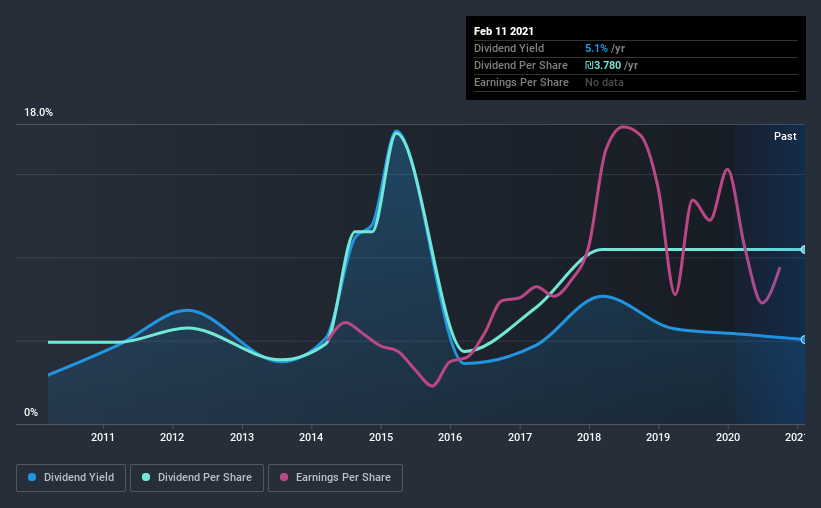- Israel
- /
- Specialty Stores
- /
- TASE:DRAL
What To Know Before Buying Dor Alon Energy In Israel (1988) Ltd (TLV:DRAL) For Its Dividend

Is Dor Alon Energy In Israel (1988) Ltd (TLV:DRAL) a good dividend stock? How can we tell? Dividend paying companies with growing earnings can be highly rewarding in the long term. If you are hoping to live on the income from dividends, it's important to be a lot more stringent with your investments than the average punter.
A high yield and a long history of paying dividends is an appealing combination for Dor Alon Energy In Israel (1988). It would not be a surprise to discover that many investors buy it for the dividends. There are a few simple ways to reduce the risks of buying Dor Alon Energy In Israel (1988) for its dividend, and we'll go through these below.
Click the interactive chart for our full dividend analysis

Payout ratios
Dividends are typically paid from company earnings. If a company pays more in dividends than it earned, then the dividend might become unsustainable - hardly an ideal situation. So we need to form a view on if a company's dividend is sustainable, relative to its net profit after tax. In the last year, Dor Alon Energy In Israel (1988) paid out 66% of its profit as dividends. A payout ratio above 50% generally implies a business is reaching maturity, although it is still possible to reinvest in the business or increase the dividend over time.
Another important check we do is to see if the free cash flow generated is sufficient to pay the dividend. Dor Alon Energy In Israel (1988)'s cash payout ratio last year was 17%. Cash flows are typically lumpy, but this looks like an appropriately conservative payout. It's positive to see that Dor Alon Energy In Israel (1988)'s dividend is covered by both profits and cash flow, since this is generally a sign that the dividend is sustainable, and a lower payout ratio usually suggests a greater margin of safety before the dividend gets cut.
Remember, you can always get a snapshot of Dor Alon Energy In Israel (1988)'s latest financial position, by checking our visualisation of its financial health.
Dividend Volatility
From the perspective of an income investor who wants to earn dividends for many years, there is not much point buying a stock if its dividend is regularly cut or is not reliable. For the purpose of this article, we only scrutinise the last decade of Dor Alon Energy In Israel (1988)'s dividend payments. Its dividend payments have declined on at least one occasion over the past 10 years. During the past 10-year period, the first annual payment was ₪1.8 in 2011, compared to ₪3.8 last year. Dividends per share have grown at approximately 7.9% per year over this time. The growth in dividends has not been linear, but the CAGR is a decent approximation of the rate of change over this time frame.
A reasonable rate of dividend growth is good to see, but we're wary that the dividend history is not as solid as we'd like, having been cut at least once.
Dividend Growth Potential
With a relatively unstable dividend, it's even more important to evaluate if earnings per share (EPS) are growing - it's not worth taking the risk on a dividend getting cut, unless you might be rewarded with larger dividends in future. It's good to see Dor Alon Energy In Israel (1988) has been growing its earnings per share at 33% a year over the past five years. Earnings per share are sharply up, but we wonder if paying out more than half its earnings (leaving less for reinvestment) is an implicit signal that Dor Alon Energy In Israel (1988)'s growth will be slower in the future.
Conclusion
To summarise, shareholders should always check that Dor Alon Energy In Israel (1988)'s dividends are affordable, that its dividend payments are relatively stable, and that it has decent prospects for growing its earnings and dividend. Dor Alon Energy In Israel (1988)'s payout ratios are within a normal range for the average corporation, and we like that its cashflow was stronger than reported profits. We were also glad to see it growing earnings, but it was concerning to see the dividend has been cut at least once in the past. Dor Alon Energy In Israel (1988) has a number of positive attributes, but it falls slightly short of our (admittedly high) standards. Were there evidence of a strong moat or an attractive valuation, it could still be well worth a look.
It's important to note that companies having a consistent dividend policy will generate greater investor confidence than those having an erratic one. At the same time, there are other factors our readers should be conscious of before pouring capital into a stock. For example, we've identified 3 warning signs for Dor Alon Energy In Israel (1988) (1 is potentially serious!) that you should be aware of before investing.
Looking for more high-yielding dividend ideas? Try our curated list of dividend stocks with a yield above 3%.
If you’re looking to trade Dor Alon Energy In Israel (1988), open an account with the lowest-cost* platform trusted by professionals, Interactive Brokers. Their clients from over 200 countries and territories trade stocks, options, futures, forex, bonds and funds worldwide from a single integrated account. Promoted
New: Manage All Your Stock Portfolios in One Place
We've created the ultimate portfolio companion for stock investors, and it's free.
• Connect an unlimited number of Portfolios and see your total in one currency
• Be alerted to new Warning Signs or Risks via email or mobile
• Track the Fair Value of your stocks
This article by Simply Wall St is general in nature. It does not constitute a recommendation to buy or sell any stock, and does not take account of your objectives, or your financial situation. We aim to bring you long-term focused analysis driven by fundamental data. Note that our analysis may not factor in the latest price-sensitive company announcements or qualitative material. Simply Wall St has no position in any stocks mentioned.
*Interactive Brokers Rated Lowest Cost Broker by StockBrokers.com Annual Online Review 2020
Have feedback on this article? Concerned about the content? Get in touch with us directly. Alternatively, email editorial-team (at) simplywallst.com.
About TASE:DRAL
Dor Alon Energy In Israel (1988)
Develops, constructs, and operates fueling complexes and commercial centers in Israel.
Proven track record and fair value.
Similar Companies
Market Insights
Community Narratives



